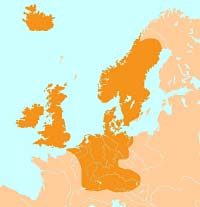Before Julian and Gregirian calenders were used, the Germanic calendars were the regional calendars used amongst the Germanic peoples.

The system was probably lunar, the Old English "mónaþ", Old Norse "mánaðr, and Old High German "mánód", as well as the modern English "month", modern Icelandic "mánuður", modern Swedish "månad", and the German "Monat", are all cognate with the word "moon".
The Germanics had their own names for the months which varied by region and dialect. They were replaced with local adaptations of the Roman months. But the Germanic people have largely kept the old Germanic names for the days of the week, most of which are named after Germanic gods.
Our main source of reference for Old English month names comes from the Venerable Bede (ca.672 - 735). He recorded the pre-Christian Anglo-Saxon month names in his Latin work known as De temporum ratione (De mensibus Anglorum).
Charlemagne (ca.742 or 747 - 814) modified the established Julian Calendar to use the agricultural Old High German names of the months in areas under his influence. They were used until the 15th century and the late 18th century (with few modifications) in Germany and in the Netherlands (sensu lato).
